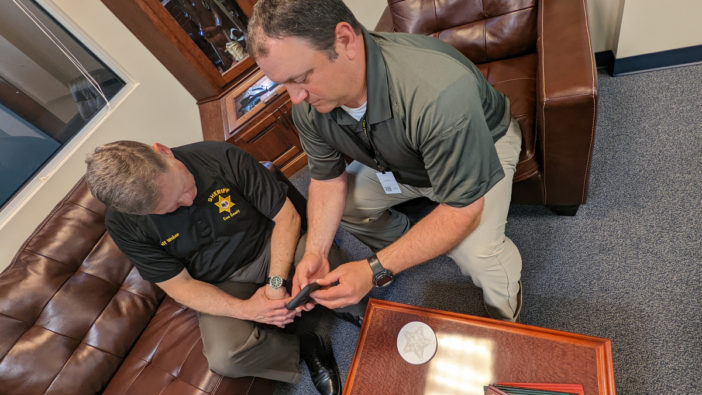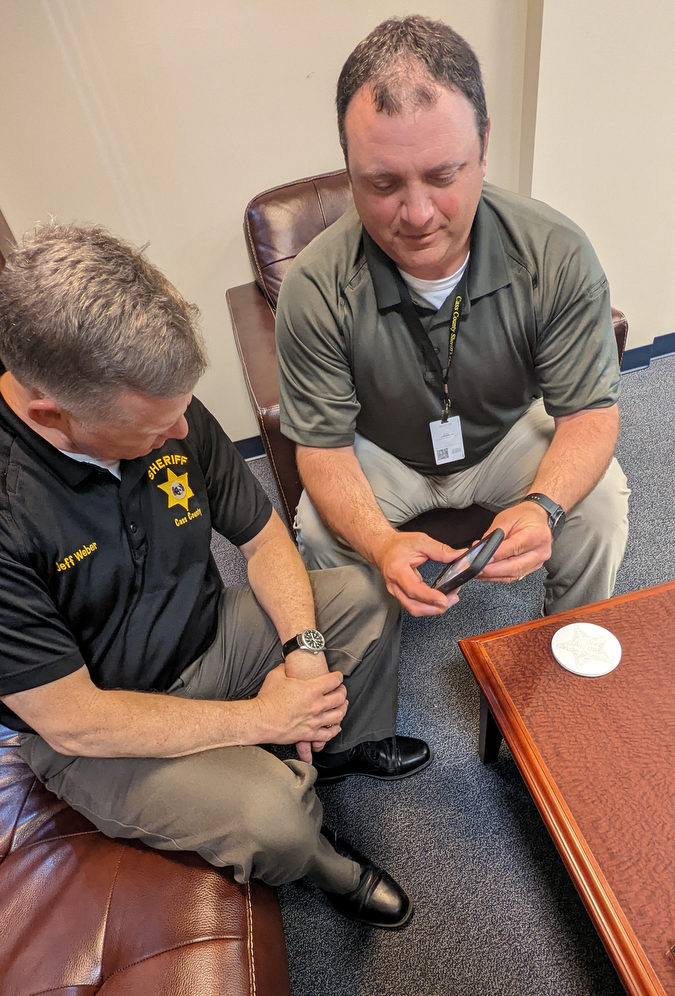For years, despite a successful private practice in Harrisonville, Mo., Dr. Scott Maid considered it part of his civic duty to be available to the Cass County Missouri Sheriff’s Office as an on-call licensed behavioral health consultant.
Over the years, the need for his services grew and in January he was hired as the first full-time Director of Behavioral Sciences at the Sheriff’s Office in the rural/suburban county about 40 miles south of Kansas City.
Sheriff Jeff Weber made the bold decision to create the position. The importance of mental health among police personnel has been a hot-button issue in recent years, particularly in the wake of increasing difficulty in recruiting, accelerating retirements and resignations, violent interactions with the public, and the high incidence of service-related deaths and suicide.
“I’d be remiss if I wasn’t taking care of my people,” said Weber, who has been in law enforcement for 31 years. “The reality is for years we have been bad about taking care of ourselves. I come from a generation where we just suck it up … This job will eat you up, all the bad things we see. If you don’t take care of yourself, it will eat you up.”
Shortly after starting full-time, Maid found a tool unlike anything any other police agency was using to track mental health assessments within the 140-person staff. The Southern California-based medical tech company, OutcomeMD, developed a software platform that interacts with patients to measure and track their symptoms over time and inform care.
Catching trauma symptoms early
For Maid, the platform was a magic bullet.
Law officers face stress and trauma unique to their profession that need to be not only treated but, hopefully, recognized in early stages.
Weber tells of an officer who had missed three consecutive July 4 holiday shifts that only came to light because of an alert supervisor.
As it turned out, the young deputy had been working on the Fourth of July and he was the first on the scene of an accident. A drunk driver had caused a horrific collision that killed four children.
“That was a marker for him,” Weber said of the significance of the holiday to the deputy. “That was trauma brought to him by just doing his job.”
“Good mental and psychological health is just as essential as good physical health for law enforcement officers to be effective in keeping our country and communities safe from crime and violence,” according the Department of Justice 2019 Report to Congress on the Law Enforcement Mental Health and Wellness Act.
In 2021 the Missouri State Senate passed a law requiring mental health “check-ins” State Bill 551, creates provisions for confidential mental health programs for law enforcement officers. The bill requires officers to meet with mental health providers at least once every three to five years.
At Cass County, Weber and Maid upped the ante, and will hold the evaluations annually.
“I applaud the legislature for at least taking that first step,” Weber said, while adding that he hopes it is “tightened up” going forward.
To Maid, it’s all about getting a grip on potential issues before they spin out of control.
“We’re trying to be proactive rather than reactive,” he said. “We try to identify problems before it affects them on the job.”
Health assessment platform yields key
Maid describes himself as decidedly non-techy. So when he sat down with a pen and paper to attempt to create a spreadsheet to track mental health in the office, it seemed monumental.
That’s when he found OutcomeMD. The company’s user-friendly app was the cure. Although designed for patients facing surgeries and other medical treatments to track and rate their symptoms and healing, Maid said it was the perfect tool for what he hoped to accomplish.
Maid believes Cass County is the first in the country to employ such a system to track mental health outcomes.
Police personnel fill out 11 assessments that are confidential to all but Maid. He said the process takes about 20-25 minutes and covers and scores areas across a wide array of psychological issues the job can create, including stress, anxiety, sleep disorders, PTSD, depression, and suicide.
Each assessment gives a numerical score up to 100, the higher the number the better.
It allows the deputies to monitor their feelings, their successes and realize possible worries over time and “see where they’re at,” Maid said.
“It was everything we needed and then some,” Maid said of the tool. “And the convenience factor made it a no-brainer.”
Maid said the assessments don’t provide diagnoses, but simply identify areas of risk and over time will give him a baseline on how deputies are faring in different areas psychologically.
Currently, the Sheriff’s Office relies on supervisors and fellow officers to let command staff know of potential trouble areas, since most officers are unlikely to self-report their symptoms.
“After the assessments, I meet with them for 30 minutes,” Maid said. “I stress this is for them.”
For example, if a deputy is having issues with substance abuse, Maid says he will provide them with information, resources, and follow-up.
However, he notes, “Ultimately it is up to them to seek services.”
Weber said it is important to have a professional on staff who is trained to analyze and spot warning signs.
The hope is the OutcomeMD platform will help identify either a warning or a trend in an area that will alert and allow Maid and other mental health professionals to proactively provide care, before it’s too late.
A national issue
Mental wellness is not recognized only as it relates to police sensitivity looking outward to its dealings with the public, but inward to the personal wellness of police officers and personnel.
In 2018, President Trump signed the Law Enforcement Mental Health and Wellness Act (LEMHWA), to improve mental health services for law enforcement through a variety of avenues. These include peer support, training, family resources, suicide prevention, and other wellness practices,
In 2022, there was only about $7.5 million in funding available for new projects.
According to the 2019 DOJ report to Congress, “An officer’s mental state affects his or her behavior in a variety of situations and can influence decision-making and judgment. However, the current state of support for officer wellness nationally is disjointed and faces both cultural and logistical obstacles.”
A 2021 independent report for the Council on Criminal Justice found it persuasive that “mental health interventions can improve self-reported mental health outcomes in officers” and that “officers who participate in supportive programs focused on resilience, self-regulation, adaptive coping skills, cognitive behavioral change, and relaxation have reduced levels of stress, negative emotions, and depression, and improved feelings of peacefulness, vitality, and health.”
Across the country efforts such as critical incident stress management programs and peer support groups have shown promise.
The trauma officers and deputies face can also radiate outward, leading the CCJ report to suggest a “trauma-informed approach to police officer wellness could benefit officers, their families, and potentially community members.”
At a March 2022 Officer Safety and Wellness Symposium in Atlanta, U.S. Attorney General Merrick Garland praised efforts undertaken by national police groups to prevent law enforcement suicide and strengthen officer wellness.
The Attorney General said he attended “because I could not think of a more important topic than officer safety and wellness.”
Cass County efforts
Maid says most of the deputies in Cass County understand the importance of being self-aware about mental health, but in the whir and buzz of work those thoughts can slip away.
“The majority understand where they are,” Maid said, “but seeing it in black and white confirms that.”
He adds that when the deputies see their mental health “scored,” many are encouraged to improve their numbers.
On a personal level, Maid said he is excited to see how trends evolve office-wide as the data come in.
The OutcomeMD platform is part of a multipronged effort by Maid and the Sheriff to uplift the employees.
“Outcome MD is a hidden gem. I can’t recommend it enough. I’d recommend it hands down,” Maid said.
Since starting in the job, Maid has been working to improve the sense of family in the Sheriff’s Office. Recently a Family Support Team network has been built. Recently wives, kids, and parents were invited to take a tour of the Cass County facilities.
“Many had never been in the building,” Maid said.
Other events ranging from PTSD training to fishing derbys are being organized.
“We believe that in getting families together they will have that support system,” Maid said. “ We want them to have that social network.”
By providing the mental wellness data privately to the deputies, Maid hopes they “are made to feel they are important and the office cares about them. This is above what others are doing.”
Maid thinks every police agency would agree on the importance of better mental health for its officers.
“It’s getting harder and harder to find employees that want to do this,” Maid said of policing. “Keeping mentally healthy is a huge ingredient.”
 Behind the Badge
Behind the Badge




